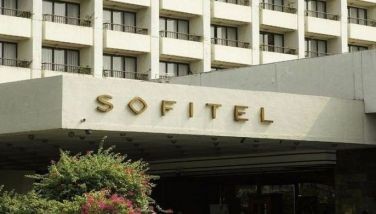Bad news

Really bad news hit the business journalism community last Thursday evening as we learned about the ambush killing of Mike Marasigan, a former editor at BusinessWorld. Of all people... Mike is about as pleasant and low key as you can imagine a journalist could be.
Mike largely worked behind the scenes editing stories and starting the pioneering online edition of BusinessWorld. He has retired from journalism and last I heard, he was helping Finance Secretary Sonny Dominguez.
I hope this is one “riding in tandem” murder case that will be solved by the police. After all, this guy was helping this administration get its tax reform program publicly accepted. My condolences to Mike’s family!
On the political scene, we have good and bad news. The good news is that President Duterte stood by his embattled customs commissioner. Mr. Faeldon may not be the brightest official who ever headed that dreadful agency, but he seems earnest in cleaning up for real.
It is just unfortunate that Mr. Faeldon and his band of former military mutineers appear to be no match to the experts in the so called “kalakalan” in that agency. Good intentions are not enough. The bad guys seem to be running circles around them.
Since a broker who got a contraband shipment cleared through the green lane said he had bribed customs officials, no one in customs, including Mr. Faeldon, is off the hook. And since the former Marine officer already publicly accused 10 congressmen of interference, he owes it to everybody to name them.
The other good news is President Duterte signed into law the extension of the validity of driver’s licenses to five years and passports to 10 years. I have been advocating this for years in this column. I credit Sec. Art Tugade who liked the idea when we talked about it before he took office and he worked for it.
In my column last Feb. 20, 2013, I wrote: “The quality of government’s front line services is still quite third world... our passports should have a 10 year validity rather than five years. Our driver’s licenses should also be valid for longer than the current three years. In the US, driver’s licenses are good for five years.
“The idea is to minimize the number of times a citizen gets in contact with a bureaucrat and thus reduce the potential for nasty experiences that reinforce the image of a government that is inept and corrupt.”
Last Oct. 5, 2016, I wrote: “Over the weekend, they (DOTr) listed their 100 days accomplishments. Here are some of them with my comments.
“1. Five year validity of drivers’ license effective in NCR by October and the rest before end of 2016.
“Yes, this was one of things I have been writing about for years and I suggested it during our first meeting together with the 10-year passport…”
The idea was a no-brainer really… and I couldn’t understand why bureaucrats didn’t like it… until the Duterte administration took over. It doesn’t look all that earthshaking an achievement, but ordinary citizens like us have simple wants… mababa ang kaligayahan. Thank you Secretary Tugade, members of Congress and the President for listening!
Then some bad news… The President succumbed to political pressure and signed the free SUC tuition proposal into law. It is a bad and useless idea. But the politicians, both Duterte’s and the Liberals, like it. It is a popular idea that’s made for the Twitter age as folks fall in love with the headline and don’t bother with the details.
Free tuition in SUCs is not likely to increase the overall college enrollment rate because it only represents one third of college education costs. The remaining two thirds is accounted for by living expenses and instructional materials. And many already get such tuition and other related subsidies.
Only a small percentage (12 percent) of the poor make it to state colleges and universities for reasons other than tuition affordability. The new law will benefit the more affluent students.
This is why the Duterte economic managers want to focus on a more targeted approach provided by another existing program called UNIFAST. The recently approved UNIFAST law provides full financing (tuition, living allowance, and other expenses) for merit scholarships for the bright, grants-in-aid for the poor, and loans for everybody else.
The bigger problem the poor students face in getting SUC admission is passing the entrance examinations. Most of them have a really bad elementary and high school education that does not prepare them for college. I do not suppose people want the SUCs, particularly UP, to lower academic standards.
I saw an internal report issued in June 2015 by the UP administration on the declining number of poor students admitted by UP. That’s not because of tuition fee problems, but because UP has kept its merit-based admission policy.
The report says more than 88,000 high school graduates competed for 15,000 freshman slots for academic year 2015-2016. To fill the slots, applicants were ranked based on their UPGs (University Predictive Grades)—a composite of UPCAT scores and high school grades.
The proportion of poor students (those belonging to households with annual income of P200,000 or less) declined from 50 percent of all UPCAT qualifiers in 2004 to 30 percent in 2014. The opposite is true in the case of students from households with annual income of P501,000 or more (their share increased from 23 percent to 40 percent).
There is also a big decline in the passing rate of the poorest students (17 percent to nine percent) and the correspondingly big rise in the passing rates of students from households with annual income of P1,000,000 or more.
While passing rates of the poor students were dropping, relatively less and less of them were taking UPCAT. The two trends combine to reduce the share of poor students in UP admission and enrollment.
The report says graduates from general public high schools are less competitive. Private HS graduates constitute 50 percent of UP admission in 2014 although these schools accounted for only 20 percent of total HS enrollment in the country in 2013. Those from ordinary public HS made up only 25 percent of UP admission in 2014 even though these schools accounted for 79 percent of total HS enrollment in 2013.
A former senior official of UP told me that for the current academic year? 2017-18 and the previous ?A?Y 2016-17, the freshmen intake of UP has been virtually 100 percent from private high schools. With the introduction of K-12, there were no ?graduates from public HS in 2016 and 2017.
To ensure that no qualified student is denied a UP education due to financial constraints, UP has streamlined the socialized tuition system, liberalized the student loan program (now covering up to 100 percent of fees due with no interest charged), increased the monthly stipend for poor students, and increased the pay for student assistants.
If we want to spend P100 billion, it is better spent to upgrade the quality of public elementary and high school education rather than universal free SUC tuition. Having more high quality science high schools per region will help poor, but talented students and get more bang from the public money spent.
It is sad that politicians, even those who should know better, passed that free SUC tuition bill more in aid of re-election than truly helping the poor get a good college education. But it is done. It’s just that public policy formulation in this country is hopelessly frustrating.
Boo Chanco’s e-mail address is [email protected]. Follow him on Twitter @boochanco.
- Latest
- Trending




























